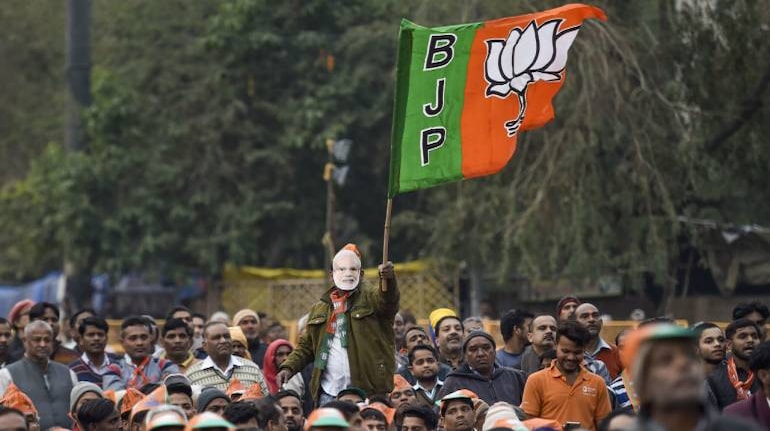



It was in all probability a coincidence that the Centre at 6.59 pm on September 5, a Saturday, announced it will conduct the first stage of computer-based tests to fill 140,000 vacancies in the Railways on December 15. Earlier in the evening of September 5, celebrated as the Teachers’ Day, young women and men had taken to social media in significant enough numbers to complain of lack of job opportunities.
If the youth are restless, sections of farmers are on the streets too, to protest the three farm sector ordinances the government introduced in the Lok Sabha on September 14.
It is in this context of edgy youth and upset farmers, economic distress and joblessness, a GDP drop of 23.9 percent in the first quarter, and rising prices of electorally-sensitive vegetables such as onions, that the ruling Bharatiya Janata Party (BJP) prepares to mark the 70th birthday of Prime Minister Narendra Modi on September 17.
The BJP is also galvanised to face, along with its allies, the assembly elections in Bihar, and by-polls to 64 assembly seats across 15-states, including 27 in Madhya Pradesh.
Blips like the number of ‘dislikes’ outstripping ‘likes’ on some of his social media pages notwithstanding, Modi’s popularity in the hearts and minds of India’s common people is enshrined like that of only two other prime ministers in the history of Independent India.
So, while it is unlikely that the government, or the BJP, will pay undue heed to calls to observe the PM’s birthday as ‘berozgari diwas’ (unemployment day), the BJP governments at the Centre and in the states have in recent weeks expressed intent or announced plans to fill vacancies in government jobs and disbursed loans to the self-employed.
Irate youth and indignant farmers, and both at the same time, is not a good portent for any ruling party. The BJP discovered this in the Gujarat Assembly polls of December 2017, which it struggled to win amid anger among the youth and farmers, and subsequently in the assembly polls a year later in Madhya Pradesh, Chhattisgarh and Rajasthan, all of which it lost.
In Madhya Pradesh and with an eye on the by-polls to 27-seats, Chief Minister Shivraj Singh Chouhan last month proposed to bring a controversial law to reserve state government jobs for locals.
Interestingly, the Centre has handpicked Madhya Pradesh for sanctioning and disbursing loans to street vendors under the PM Street Vendors’ AtmaNirbhar Nidhi (SVANidhi) scheme launched on June 1. The objective of the scheme is to provide collateral free working capital loans of up to Rs 10,000 of one-year tenure to 5 million street vendors across India.
The loan processing under the scheme started on July 2. According to a written reply in the Rajya Sabha on September 16, the government said that until September 14, it received 1.159 million applications, sanctioned 406,000, and disbursed 102,000 loans under the scheme.
In this, applications from Madhya Pradesh were 268,000, followed by 216,000 each from Uttar Pradesh and Telangana. All other states lagged far behind. Of the applications from Madhya Pradesh, 160,000 loans were sanctioned and 85,004 loans already disbursed. For Telangana, while 73,249 loans were sanctioned, only 4,575 disbursed. In UP’s case, 41,757 loans were sanctioned and only 2,048 disbursed.
It would be interesting to see if much of the disbursal of these loans might have taken place in the Gwalior region, the stronghold of BJP leader Jyotiraditya Scindia, and where nearly all the by-polls will take place. On September 12, Modi said 1.8 million houses have been constructed under the PM Awas Yojana during the COVID-19 period, of which 175,000 constructed in MP’s rural areas.
In Bihar, the other poll bound state, and recovering from the onslaught of floods in 16 of its 38 districts, Modi has announced a slew of infrastructure projects. Chief Minister Nitish Kumar is also on a spree to inaugurate projects and buildings, and allocations for MNREGA work could increase now that floodwaters have receded. The Rs 20,500 crore Matsya Sampada Yojana that the PM has announced will have its focus on Bihar, especially its crucial fisherfolk community of Nishads, which comprises 8 percent of the electorate.
The Centre has also set up the National Recruitment Agency (NRA) to conduct tests, and to shortlist candidates for some categories of central government jobs.
Last November, the government told Parliament there were 700,000 vacancies in central government jobs, and the process was on to fill 408,951.
These include 103,769 vacancies for track maintainers and ‘pointsmen’ that the Railway Recruitment Board first notified on February 23, 2019, on the eve of the Lok Sabha polls. These are yet to be filled.
It can be expected that they will get filled by the time of the Uttar Pradesh assembly polls in March 2022, also the date set for building a ‘new India’ to mark the 75th year of Independence.
Archis Mohan is a Delhi-based senior journalist. Views are personal.Discover the latest Business News, Sensex, and Nifty updates. Obtain Personal Finance insights, tax queries, and expert opinions on Moneycontrol or download the Moneycontrol App to stay updated!
Find the best of Al News in one place, specially curated for you every weekend.
Stay on top of the latest tech trends and biggest startup news.